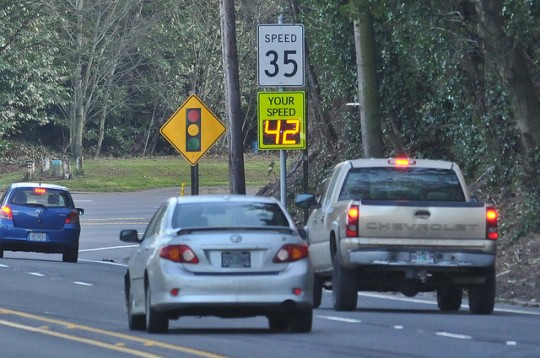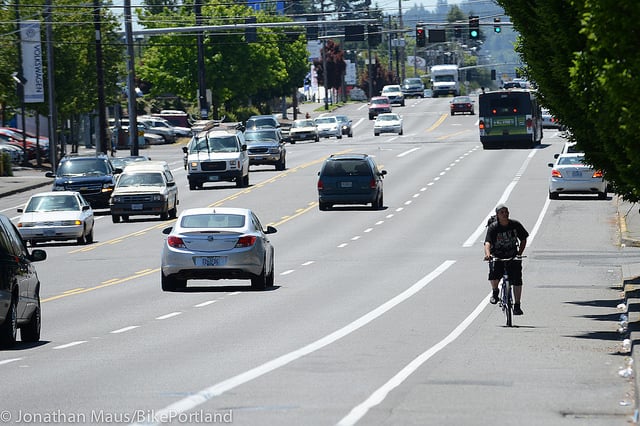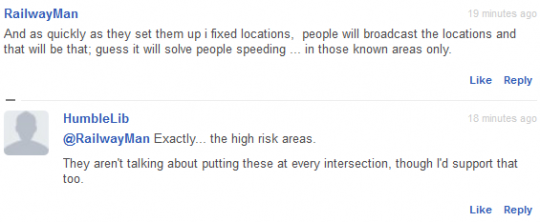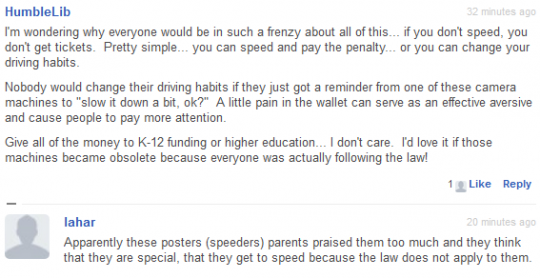
(Photos: J.Maus/BikePortland)
When it comes to the rules of the road, there are a few facts of life — or, as sociologists might call them, social norms.
When people are in cars, they tend to drive over the speed limit if they feel it’s safe to do so and they can get away with it.
When people are on bikes, they tend to roll through stop signs if they feel it’s safe to do so and they can get away with it.
When people are on foot, they tend to cross the street whenever they feel it’s safe to do so and they can get away with it.
The key difference between those scenarios is that one of them is far more likely to result in injuring or killing someone other than the person doing it. It’s also, of the three, possibly the most commonly broken law in the history of the world — and of the three, the least likely to provoke outrage by an average American.
The city says that according to law enforcement records, at least 46 percent of metro-area traffic fatalities are speed-related. That doesn’t include fatalities that may have been coded with different factors — drunken driving, for example — but were also speed-related.
In 2013, the last year with full statistics available, traffic killed 109 people in the four-county metro area.
Speeding may be against the law, but in the United States it’s as powerful a social norm as stopping for a red light even if nobody else is coming.
This wasn’t always the case. In 1923, the U.S. auto industry successfully killed a campaign to install a device in every car that would force it to drive at a mostly nonlethal 25 mph.
Now the City of Portland is essentially proposing something similar, except only for its 10 most dangerous streets: to install automatic cameras that would send tickets to people who break the law by exceeding speed limits by more than several miles per hour.
Here’s why that matters: it has the potential to change social norms just as surely as the 25-mph devices might have if they’d ever been installed, back in 1923.
There’s no question that the perception of “bicyclists” as “scofflaws” is one of the single biggest political problems of bicycling advocacy. When one human sees another violating a social norm — especially someone who looks different or unfamiliar in some way — we feel a powerful urge to put them into the drawer in our brain labeled Others.
Six years ago, Oregon’s bicycling advocacy community more or less fell on its own sword in a failed attempt to get around this problem by legalizing something that most people do anyway — treat stop signs as yield signs.
Advertisement
Today, there’s a bill in Salem that turns things on its head. Instead of trying to legalize an illegal social norm (rolling through stop signs on a bike) it tries to enforce penalties of a social norm that’s already illegal (speeding on dangerous streets in a car).
And here’s the interesting thing: because speeding is already both illegal and obviously dangerous, some people are willing to turn against it. The Oregonian comment section, rarely more than a torrent of hatred toward various Others, is surprisingly divided about the merits of this bill.
To be clear, maybe three-quarters of the comments about this bill on the Oregonian’s website seem to oppose it, or at least to argue that it’s more about revenue than safety. (An opinion that, to be honest, isn’t ridiculous.)
But for city lovers and safety advocates, the real promise of speed-detection cameras isn’t that they’d bring in money, or even that they’d impose legal penalties on some drivers.
The promise of speed-detection cameras is that because they’re self-financing, it’s possible to install enough of them to change the social norm. The promise of speed cameras is that they might once again turn people who drive at illegally lethal speeds into the Other.









